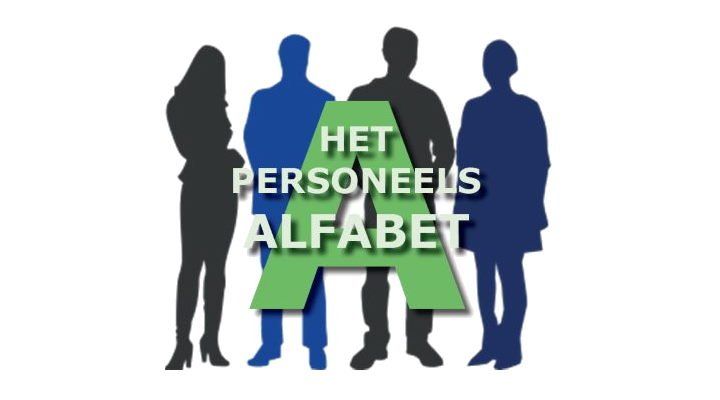The Staff Alphabet
On June 12, 2019, our second book saw the light of day. The personnel alphabet from A to Z tells everything about personnel in short, clear chapters. It is mainly intended to help the small(er) entrepreneur in the field of tax and employment law. Where large(r) companies employ people to manage everything with staff in the right direction, this is often a time-consuming matter for small employers. The Personnel Alphabet is a small reference book on matters such as payroll, collective labor agreements, pensions, contracts and so on. Here's a little glimpse into the book. We start with the introductory chapter on Labor.
LABOR, the first chapter of the Staff Alphabet
How successful a business is depends on many factors. One of them is staff. How well are employees able to help build success with the input of their labor? Or should you, as an entrepreneur, temper your expectations when it comes to staff?
Nothing human is alien to us.
An expression in which the speaker indicates that he is human and therefore not perfect. Staff is not perfect and certainly not a clone of the entrepreneur.
To kick off in The Personnel Alphabet, the subject of Labor is appropriate. In the other chapters, the legal regulations regarding the employment of staff are discussed and we also try to include social and societal aspects of being an employer. You don't have to read it in order from A to Z. Read what appeals to you or what you have to deal with or will have to deal with.
Labor definition
In economics, labor is one of the factors to produce goods or services. The other factors are capital and natural raw materials or resources (eg metals or oil).
The economic definition of labor is 'all mental and physical effort of people in the service of production'. In earlier times this was more physical production, think of pots and pans, houses and roads. Production can also be a service. In the past decades, we in the Netherlands have moved from the production of goods to the production of services. Financial services are an example of this.
The history of labor
In the past, people met their needs by hunting and gathering food. The communities were small, there was close cooperation between the people and a division of labor.
In principle, these were already a kind of labor relations that existed on a basis of reciprocity.
Agriculture has brought about the greatest changes. Man no longer had to travel as a nomad with a minimum of stuff. Agriculture made it possible to stay in a fixed location. At this fixed location it was possible to produce more than was necessary and to keep stocks. This meant that not everyone had to deal with making and collecting food. They could go on to perform other tasks. In this way, labor specialization came about. Think of the rise of bread bakers, potters, carpenters, weavers and so on.
With the advent of cities and city-states came tributary labor relations. The upper class of society, political and spiritual leaders, demanded a contribution (a tribute) from the common citizen in the form of service. For the citizen, this was offset by a redistribution of goods. As time progressed, wage and slave labor developed, followed by self-employment.
The industrial revolution has changed many labor relations. The transition from hand-made to machine-made goods increased the demand for labour. The cottage industry such as women who made clothes, spun or weaved clothes at home disappeared on a large scale. Many workers in the 19th century worked as wage laborers in factories. Conditions were not good in the factories, people worked against starvation wages and in appalling conditions. This has led to more legal protections for workers.
In the 20th century you see a return to homework. Thanks to the internet and computers, people are no longer tied to a workplace and can therefore also perform work at home (platforms such as Mechanical Turk).
Sometimes home becomes the whole world. We now also have the digital nomads, people who can carry out their work anywhere in the world and make use of it. This can be tax-related because the question is where your income is earned and where you are taxed.
Labor and wages
Under this heading, paid employment is discussed. In the event of an employment contract, an employment contract is concluded between employer and employee. According to article 7:610 paragraph 1 of the Dutch Civil Code, an employment contract is an agreement whereby one party, the employee, undertakes to perform work for a certain period of time in the service of the other party, the employer, for wages. This is a beautiful sentence but what does it mean?
In fact, it means that there is an employment contract (employer – employee situation) if this meets three conditions:
- Is there personal work?
This is the part in which the employee undertakes to perform work for a certain period of time. It must therefore be done by the employee himself or (in a broader context) by someone who comes from a group selected by the employer.
- Is there a relationship of authority?
This is about the part 'in the service of the other party'. The point here is that the person works according to the employer's instructions. There is subordination. Subordination does not mean that there is no independence of work. The point is that the employer can give instructions that must be followed.
- Is there a salary?
Wage is the consideration for the work done. This can be in the form of money, but also wages in kind. For example, consider the use of a company residence.
No employment contract, but work
According to Article 7:610 paragraph a of the Dutch Civil Code, there is a presumption of an employment contract when someone performs work for another person for three consecutive months, weekly or at least 20 hours per month.
Other shapes
In addition to employment contracts for an indefinite period (permanent employment) and fixed-term contracts, flex contracts (such as zero hours and min-max contracts) and on an assignment basis (freelancers) are also in vogue in the Netherlands. Work based on permanent contracts has crumbled in recent decades and flexible work is on the rise.
So much for the first chapter as an introduction to this book.
We hope you enjoy reading the following chapters. If while reading the Jewish saying “I wish you a lot of staff” (a saying that is not exactly intended to wish you good luck), take the following statements from Albert Plesman (KLM) to heart:
People who don't make mistakes don't work.
and Ray Kroc (McDonalds):
As a director, you are only as good as the people who work for you.
It is understandable that there is a field of tension between employer and employee. The day and night also serve two different purposes.
- Definition Lycaeus Economic DictionaryKarl Polanyi. Jewish-Hungarian economist. According to him, there were three types of distribution systems: reciprocity, redistribution and exchange. These were all mainly socially determined. Farewell speech by Prof. dr. Dr JMWG Lucassen – The History of Labor at a Glance, July 6, 2012. www.mturk.com



